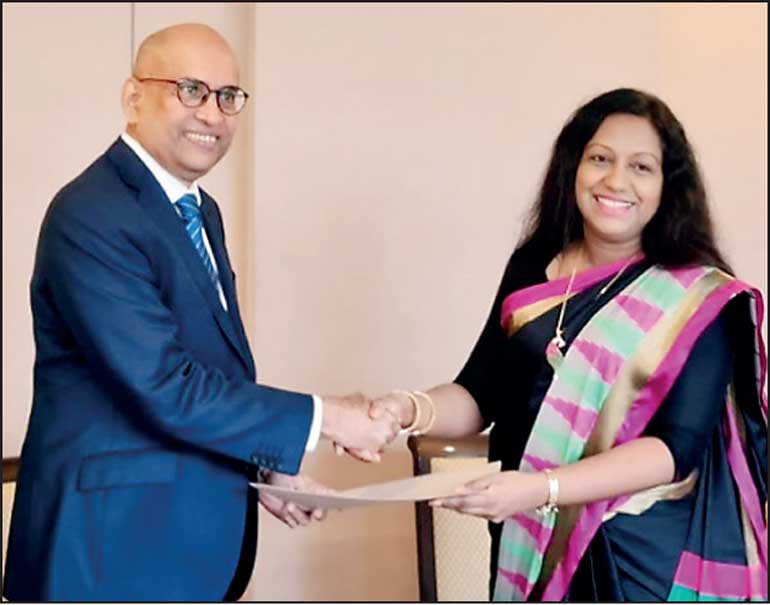Monday Feb 16, 2026
Monday Feb 16, 2026
Wednesday, 24 August 2022 00:21 - - {{hitsCtrl.values.hits}}

SLID Chairman Faizal Salieh and TISL Executive Director Nadishani Perera exchange the MoU signed between the two organisations
The Sri Lanka Institute of Directors (SLID) recently entered into a strategic collaboration with Transparency International Sri Lanka (TISL) to launch an initiative under the theme ‘Business Against Corruption’.
Under this theme, the two institutions will work together to facilitate and enable businesses mitigate the risk of corruption.
The roadmap planned over a three-year time horizon includes a series of programs and activities to create awareness on the issue, key stakeholder engagements, training programs incorporating international best practices on the subject, instilling sound values of transparency, accountability, integrity, fair market competition, fair pricing, ethical business practices, credible leadership and building a strong inner resilience framework.
SLID Chairman Faizal Salieh said: “We are mindful of the current state of affairs, the ground realities, and the challenges faced by companies in doing business. Therefore, our approach on this journey is pragmatic and practical and will enable businesses to proactively and progressively mitigate the corruption risk using preventive measures, checks and balances on a voluntary, ‘best efforts’ basis.”
TISL Executive Director Nadishani Perera said: “Businesses play a critical role in any nation’s efforts against corruption. At this unique and transformative moment in Sri Lanka’s history, as the citizens have risen against corruption, it is of utmost importance that the business community also commits to do its part towards this mission. TISL is honoured to partner with SLID to support this ‘Business Against Corruption’ initiative, with renewed hope for the country.”
Both SLID and TISL are committed to working closely with the business community to raise the integrity of our nation and make it a better investment destination.
SLID said corruption has been identified as a root cause of the current political and economic crisis in Sri Lanka by several analysts. It exists at the business, public, and Government levels and needs to be addressed in the national search for solutions to the present crisis with a view to ensuring the country’s economic recovery and long-term sustainability. Corruption endangers and discourages investment, leads to the misallocation of resources, creates uncertainty, and results in high social costs. Mitigating corruption will make way for Sri Lanka to become an attractive destination for good, long-term investments.
Corruption has plagued Sri Lanka for many years and still continues to do so. Sri Lanka is ranked 102nd in Transparency International’s most recent Corruption Perception Index (2021), which ranks 180 countries and territories by their perceived levels of public sector corruption. Article IV of the report recommends that “efforts to strengthen governance and reduce corruption vulnerabilities should continue.”
In the absence of strong legal requirements for corporates to prevent and resist corruption, it is imperative that the business sector looks to international best practices and alternative voluntary avenues in order to uphold standards of ethics and integrity in business.
SLID believes that now is the time for companies to step forward in response to the compelling national need to eliminate corruption and be part of a collective business action to progressively strengthen their internal resilience against corruption at the strategic level and transaction level.
“Crises, as serious as the one we have now, consume people and systems. We as a people should pursue what is good and right for the country in the long-term, and rise above narrow short-term interests. At this turning point of our nation, making appropriate long-term structural changes is imperative,” SLID added.